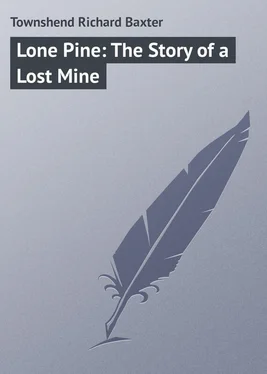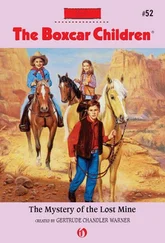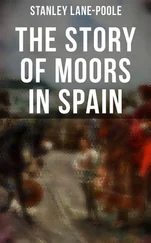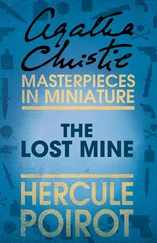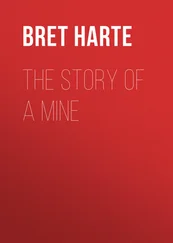Richard Townshend - Lone Pine - The Story of a Lost Mine
Здесь есть возможность читать онлайн «Richard Townshend - Lone Pine - The Story of a Lost Mine» — ознакомительный отрывок электронной книги совершенно бесплатно, а после прочтения отрывка купить полную версию. В некоторых случаях можно слушать аудио, скачать через торрент в формате fb2 и присутствует краткое содержание. Жанр: foreign_prose, foreign_adventure, на английском языке. Описание произведения, (предисловие) а так же отзывы посетителей доступны на портале библиотеки ЛибКат.
- Название:Lone Pine: The Story of a Lost Mine
- Автор:
- Жанр:
- Год:неизвестен
- ISBN:нет данных
- Рейтинг книги:4 / 5. Голосов: 1
-
Избранное:Добавить в избранное
- Отзывы:
-
Ваша оценка:
- 80
- 1
- 2
- 3
- 4
- 5
Lone Pine: The Story of a Lost Mine: краткое содержание, описание и аннотация
Предлагаем к чтению аннотацию, описание, краткое содержание или предисловие (зависит от того, что написал сам автор книги «Lone Pine: The Story of a Lost Mine»). Если вы не нашли необходимую информацию о книге — напишите в комментариях, мы постараемся отыскать её.
Lone Pine: The Story of a Lost Mine — читать онлайн ознакомительный отрывок
Ниже представлен текст книги, разбитый по страницам. Система сохранения места последней прочитанной страницы, позволяет с удобством читать онлайн бесплатно книгу «Lone Pine: The Story of a Lost Mine», без необходимости каждый раз заново искать на чём Вы остановились. Поставьте закладку, и сможете в любой момент перейти на страницу, на которой закончили чтение.
Интервал:
Закладка:
"Just so," assented the prospector; "I'm the only one there is anywhere around here. I've been playing a lone hand down in these parts all winter. For six months I haven't spoken to an American except the stage-driver."
It was a relief to him to talk English to anyone again after so long an interval, although he was not exactly prepossessed by Mr. Backus's looks, nor by the only thing he knew for certain about him, namely, that he had gone and married a Mexican wife, a decidedly eccentric thing for an American to do, in Stephens's eyes. But the mere sound of his native language again was music in his ears, even though it were spoken by a man as illiterate as the storekeeper. For, compared to the other, Backus was illiterate. And it was a thing worth noting about Stephens, who had had the advantage of a high-school education, that though he now freely made use of the rude, vigorous colloquialism of the West, – so much so, indeed, that he talked to himself in it, – yet he could drop it in a moment on occasion. Before a stranger for whom he felt an instinctive distaste, he at once became formal, and his language took on a precision and his tone a punctiliousness that were foreign to his more familiar discourse. As he would have said of himself, "If I don't cotton to a man at once, I always feel like putting on a lot of frills."
"You bin long in these parts?" inquired Mr. Backus carelessly.
"About a year now in New Mexico," replied Stephens; "but I've been in this Western country a good deal longer than that. I'm not a tenderfoot, exactly, if I may say so; I didn't come to this country for my health."
Many men whose lungs are affected have hoped to shake off their dread malady by breathing the pure, thin, dry air of Colorado and New Mexico. The hardy Western pioneer pities the consumptive patient; he succours him freely in distress; and, above all things, he hates to be mistaken for one himself. Stephens was determined that his fellow-countryman should be under no misapprehension on this point.
"No," laughed Mr. Backus lightly, "nor you don't look much like one of them pore health-seekers neither. Say, though," he continued, more warily, "you'll excuse my axin', but was you never in New Mexico before this last year?"
"No," replied Stephens – "that is – yes, I should have said," correcting himself, "I was once, but only for a short time, and that was some years ago, and not in this part of the Territory." He shifted his position against the adobe wall a little, and laid down on the counter in a casual sort of way the parcel and the mail matter which he was holding, as if to indicate that he was ready for a long chat. In reality he was setting his hands free in case he might possibly need to use them. To be at all closely questioned about one's past life by an absolute stranger acts on the experienced Western man as a danger signal. He noted the intense glow in Backus's eyes, and as he did so he grew conscious of a strange sense of doubleness in his own brain, as if all this scene had been enacted once before, and he ought to know what was coming next. He shifted his waist-belt and left his thumbs resting lightly on the buckle in front; it was a perfectly natural thing to do, and yet it left his right hand within six inches of the trusty Colt's revolver at his hip. Assuredly Stephens was no tenderfoot; he was watching every motion of Backus out of the corner of his eye.
"Say, stranger," began the latter, leaning forward over the counter, and speaking low and clear, "no offence, but I want to ax you a certain question. It's a little sudden-like, but I have a reason for it; allers no offence, you understand?"
"You can ask me any question you have a mind to, Mr. Backus," said Stephens coolly. "Of course, whether I answer it or not is my choice."
Mr. Backus might be his fellow-countryman, but he must learn not to be presuming. Almost unconsciously to himself his tone hardened. Stephens could stand the easy familiarity of races that were not his own, and treat the Indians of Santiago with a friendliness that was all the more kindly for his own underlying sense of superiority, but for an American to treat him lightly was another matter. The pride and reserve that had grown up in solitude revolted at this man's inquisitiveness.
"Wal' then, stranger," continued Backus, with an apologetic manner that was due to the other's change of voice, "allers, as I said before, meanin' no offence, did you ever happen to kill a man?"
Manuelita, though apparently absorbed in a rose-sprigged muslin, caught a note in the Texan's tone that aroused her vigilance. She knew no English, but her quick brain divined that when he asked, "Did you ever kill a man?" he was putting no common question.
Stephens started at the abrupt query, and his face flushed. He paused a moment, looking hard at the other; then he slowly answered, "I don't know that I have ever killed anyone."
"Meanin', I take it," rejoined the other, "that you don't know for certain, neither, that you haven't. I ax yer pardon again, stranger, but as sure as God made little apples I've got a reason for what I'm saying. That ar' time you was in New Mexico years ago that you spoke of just now, was you, by any chance, at the battle of Apache Cañon?"
The words "Apache Cañon" sent a thrill through Manuelita; she knew well that there had been a bloody fight there.
"Yes," answered Stephens, a strange new light beginning to dawn upon him; "I fought at Apache Cañon, if you must know."
"You was on the Northern side, warn't you?" queried the storekeeper again.
"Yes," said the prospector quietly; "I was a volunteer in the Second Colorado Regiment."
"By gum, then, I knowed it!" cried the Texan excitedly; "you was one of the Pet Lambs."
At the beginning of the Civil War the Colorado troops, a pretty tough lot, were sometimes sportively alluded to as the "Pet Lambs."
A dry smile came to Stephens's lips at the sound of the old name. "I was a Lamb," said he.
"And I was one of Baylor's Babes," returned the other.
"Baylor's Babes" was the nickname bestowed upon a force of Texas rangers who invaded New Mexico, and had the audacity to propose to conquer the whole Rocky Mountain country for Jefferson Davis off their own bats.
"Yes, you bet I was a Babe," he repeated, "and a whale of a Babe at that, and hurrahed for Jeff Davis as long as I could stand. But that's all over and done with now, and we've buried the war hatchet. But say, stranger, do you happen to recollect what kind of a wepping you was carrying at Apache Cañon? There warn't no Winchesters in them days," he added, patting the parcel of cartridges that lay on the counter.
"I was armed with a muzzle-loading Springfield U.S. rifle, altered in Denver to fire with a tape cap," replied Stephens. His nerves grew tense, and he braced himself for a possible struggle to the death, for he thought the Texan was about to spring on him; but he only asked with quaint earnestness:
"Du tell; what's a tape cap, mister?"
"Why, did you never see one?" said Stephens. "But of course they're out of date now. It was a dodge for capping a gun automatically. There was a tape fitted with caps that was fed forward on top of the tube in front of the hammer. It worked like a charm. You bet there was no time lost fumbling around in your pouch for a cap with your fingers if you had one of them fixed on your gun."
"Great Scot!" cried Backus, "then now I know how't was."
He raised his hands so suddenly to the neck of his shirt that he made Stephens think he was reaching for the bowie-knife which some fighting men carry in a sheath under the coat at the back of the neck. Manuelita thought the same thing, and drew her breath hard, feeling her heart leap with terror. Instinctively Stephens's fingers found the butt of his revolver, but he felt paralysed at the thought of the defenceless women by the counter. If there was to be a fuss, how could they make their escape before it began?
Читать дальшеИнтервал:
Закладка:
Похожие книги на «Lone Pine: The Story of a Lost Mine»
Представляем Вашему вниманию похожие книги на «Lone Pine: The Story of a Lost Mine» списком для выбора. Мы отобрали схожую по названию и смыслу литературу в надежде предоставить читателям больше вариантов отыскать новые, интересные, ещё непрочитанные произведения.
Обсуждение, отзывы о книге «Lone Pine: The Story of a Lost Mine» и просто собственные мнения читателей. Оставьте ваши комментарии, напишите, что Вы думаете о произведении, его смысле или главных героях. Укажите что конкретно понравилось, а что нет, и почему Вы так считаете.
